中考英语分册复习之新目标九年级英语 Units 12-14 课件(64张PPT,无音频)
文档属性
| 名称 | 中考英语分册复习之新目标九年级英语 Units 12-14 课件(64张PPT,无音频) | 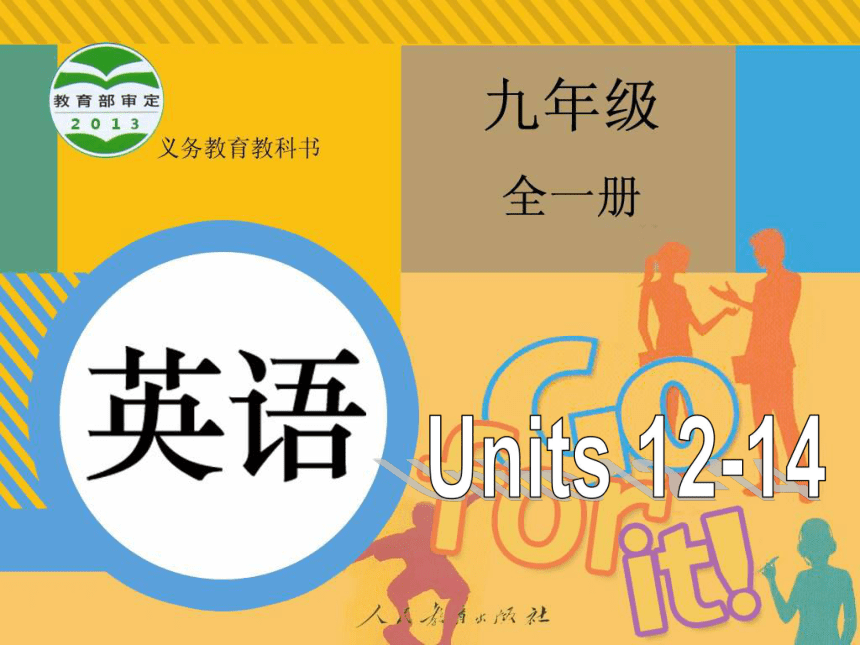 | |
| 格式 | zip | ||
| 文件大小 | 1.2MB | ||
| 资源类型 | 教案 | ||
| 版本资源 | 人教新目标(Go for it)版 | ||
| 科目 | 英语 | ||
| 更新时间 | 2020-01-19 22:09:59 | ||
图片预览

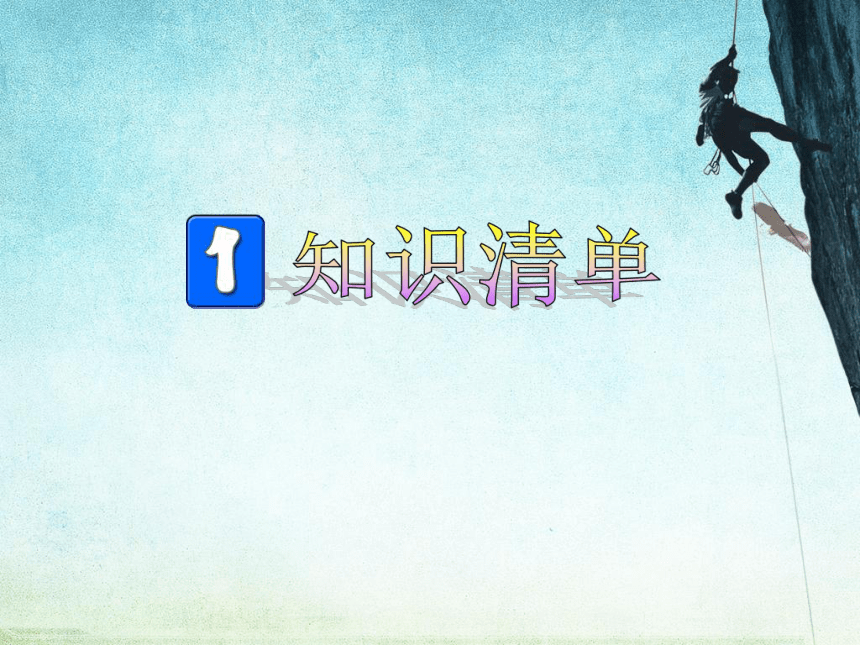
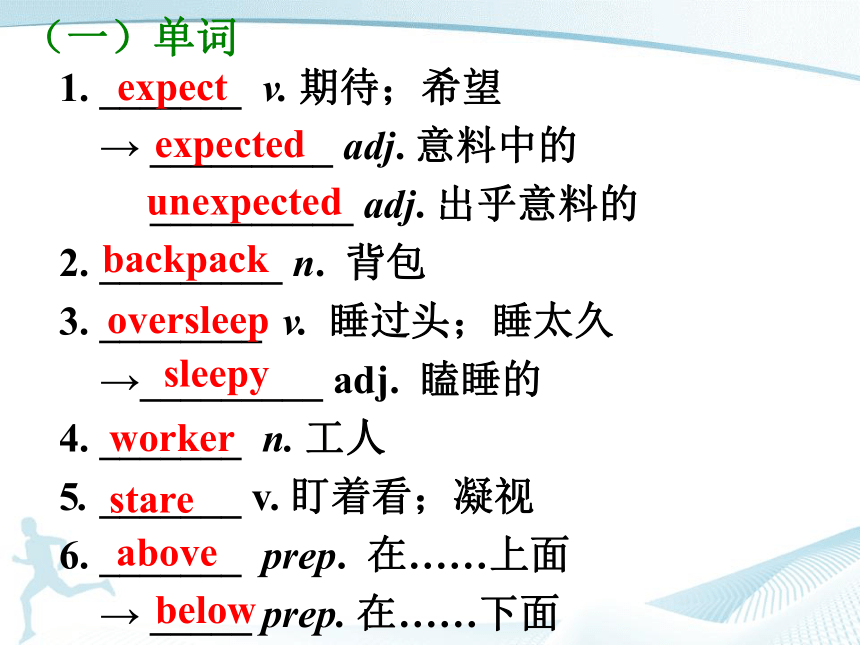
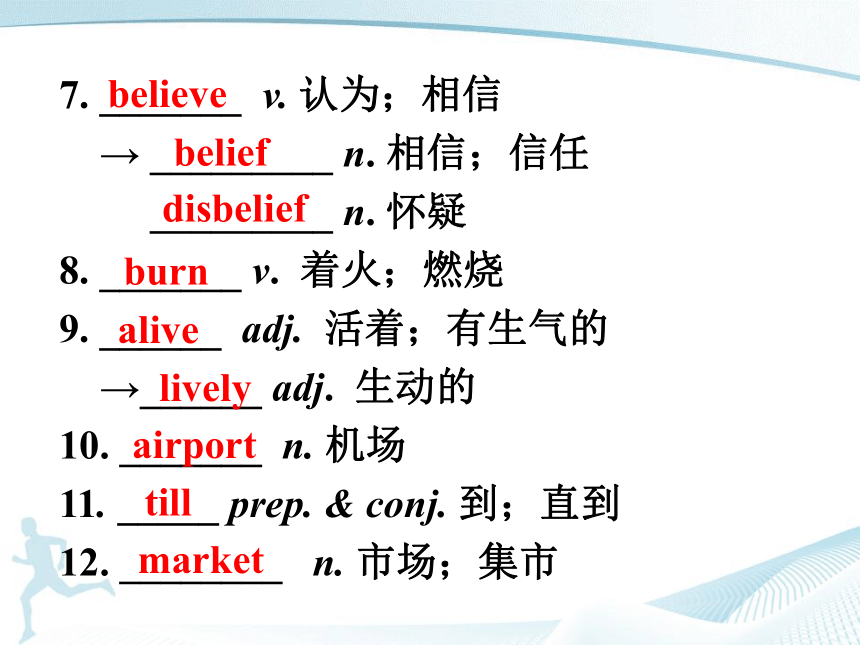
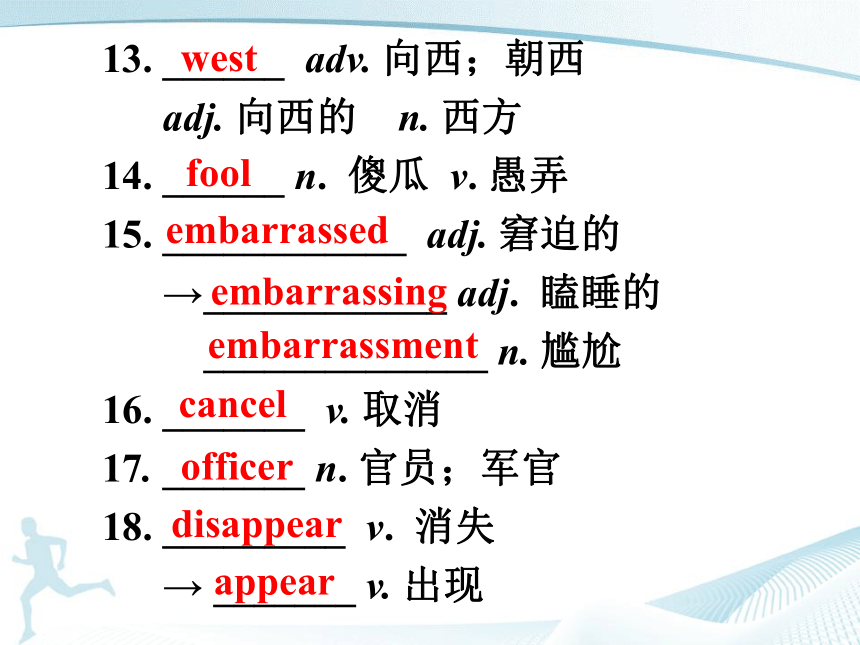
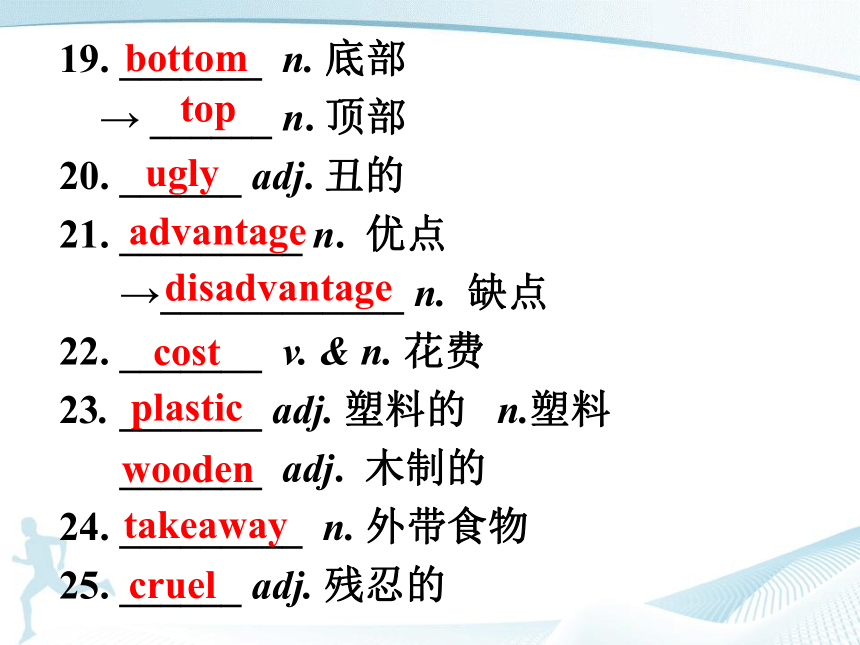
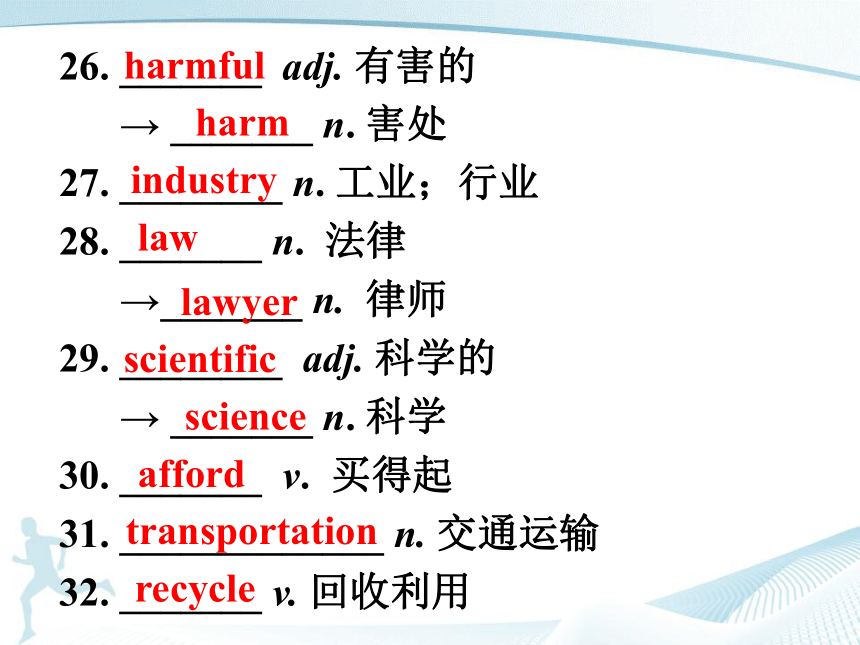
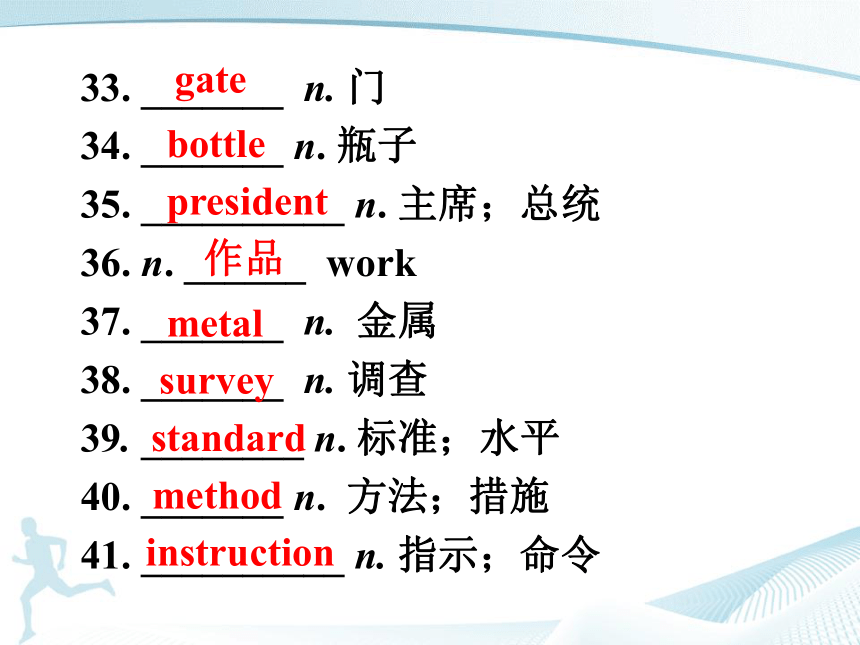
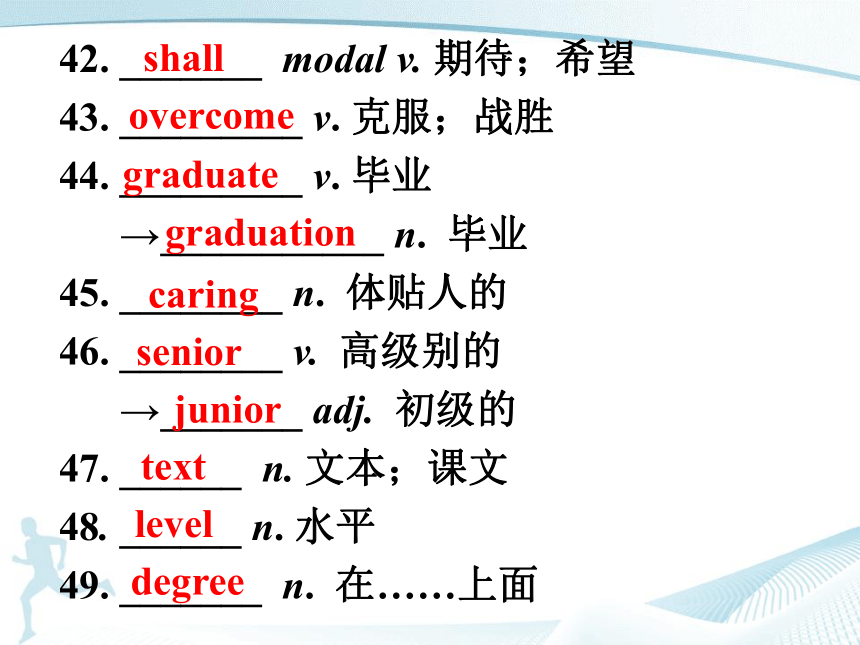

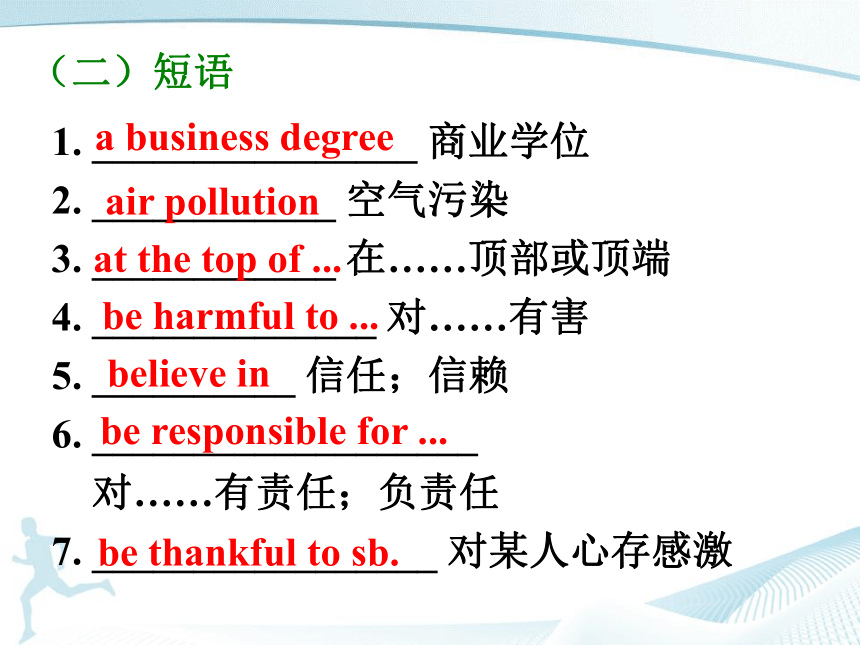
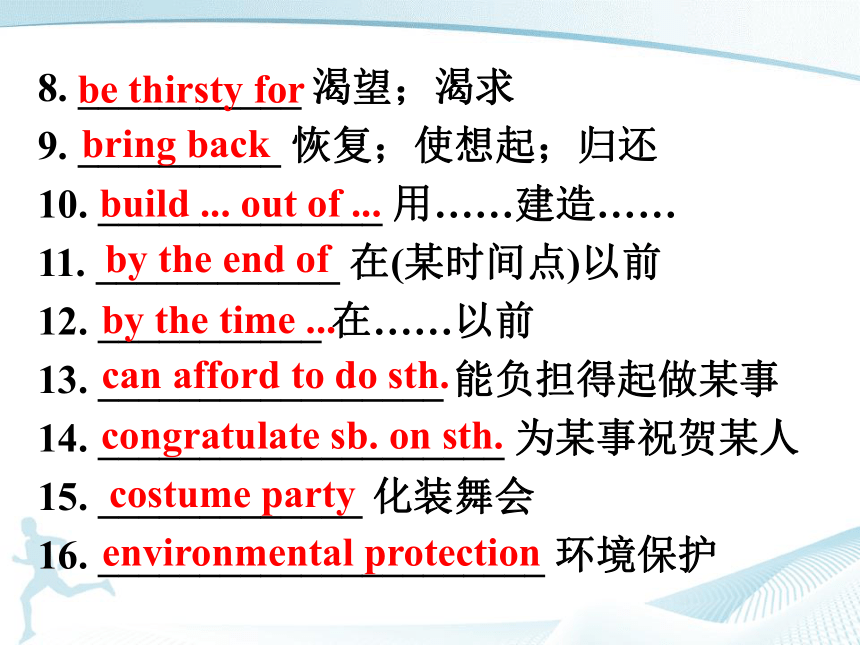
文档简介
课件64张PPT。Units 12-14知识清单(一)单词1. _______ v. 期待;希望
→ _________ adj. 意料中的
__________ adj. 出乎意料的
2. _________ n. 背包
3. ________ v. 睡过头;睡太久
→_________ adj. 瞌睡的
4. _______ n. 工人
5. _______ v. 盯着看;凝视
6. _______ prep. 在……上面
→ _____ prep. 在……下面expectexpectedunexpectedbackpackoversleepsleepyworkerstareabovebelow7. _______ v. 认为;相信
→ _________ n. 相信;信任
_________ n. 怀疑
8. _______ v. 着火;燃烧
9. ______ adj. 活着;有生气的
→______ adj. 生动的
10. _______ n. 机场
11. _____ prep. & conj. 到;直到
12. ________ n. 市场;集市believebeliefdisbeliefburnalivelivelyairporttillmarket13. ______ adv. 向西;朝西
adj. 向西的 n. 西方
14. ______ n. 傻瓜 v. 愚弄
15. ____________ adj. 窘迫的
→____________ adj. 瞌睡的
______________ n. 尴尬
16. _______ v. 取消
17. _______ n. 官员;军官
18. _________ v. 消失
→ _______ v. 出现westfoolembarrassedembarrassingembarrassmentcancelofficerdisappearappear19. _______ n. 底部
→ ______ n. 顶部
20. ______ adj. 丑的
21. _________ n. 优点
→____________ n. 缺点
22. _______ v. & n. 花费
23. _______ adj. 塑料的 n.塑料
_______ adj. 木制的
24. _________ n. 外带食物
25. ______ adj. 残忍的bottomtopuglyadvantagedisadvantagecostplasticwoodentakeawaycruel26. _______ adj. 有害的
→ _______ n. 害处
27. ________ n. 工业;行业
28. _______ n. 法律
→_______ n. 律师
29. ________ adj. 科学的
→ _______ n. 科学
30. _______ v. 买得起
31. _____________ n. 交通运输
32. _______ v. 回收利用harmfulharmindustrylawlawyerscientificscienceaffordtransportationrecycle33. _______ n. 门
34. _______ n. 瓶子
35. __________ n. 主席;总统
36. n. ______ work
37. _______ n. 金属
38. _______ n. 调查
39. ________ n. 标准;水平
40. _______ n. 方法;措施
41. __________ n. 指示;命令gatebottlepresident 作品metalsurveystandardmethodinstruction42. _______ modal v. 期待;希望
43. _________ v. 克服;战胜
44. _________ v. 毕业
→___________ n. 毕业
45. ________ n. 体贴人的
46. ________ v. 高级别的
→_______ adj. 初级的
47. ______ n. 文本;课文
48. ______ n. 水平
49. _______ n. 在……上面shallovercomegraduategraduationcaringseniorjuniortextleveldegree50. ________ n. 经理
51. __________ n. 先生;绅士
52. ___________ v. 毕业
→_____________ n. 毕业
53. ________ adj. 口渴的;渴望的
54. _________ adj. 感激的
55._______ n. 任务;工作
56. ______ adv. 向前面
57. ________ v. 分离;分开
58. ______ n. 翅膀managergentlemancongratulatecongratulationthirstythankfultaskaheadseparatewing1. ________________?商业学位
2. ____________?空气污染
3. ____________?在……顶部或顶端
4. ______________?对……有害
5. __________?信任;信赖
6. ___________________?
对……有责任;负责任
7. _________________?对某人心存感激(二)短语a business degreeair pollutionat the top of ...be harmful to ...believe inbe responsible for ...be thankful to sb.8. ___________?渴望;渴求
9. __________ 恢复;使想起;归还
10. ______________?用……建造……
11. ____________ 在(某时间点)以前
12. ___________?在……以前
13. _________________?能负担得起做某事
14. ____________________?为某事祝贺某人
15. _____________?化装舞会
16. ______________________?环境保护be thirsty forbring back?build ... out of ...by the end of?by the time ...can afford to do sth.congratulate sb. on sth.costume partyenvironmental protection17. _________?首先
18. __________?捎……一程
19. _________ (时间)?逝去;过去
20. ________________ 指导某人做某事
21. ___________?连续几次地
22. _____________ (与……)成一排
23. _______________ 沉住气;保持冷静
24. _____________?土地污染
25. __________ 动身去某地
26. ___________?回首(往事);回忆;回顾first of allgive ... a liftgo byguide sb. to do sthin a rowin line withkeep one’s coolland pollutionleave for?look back at27. __________ 减肥
28. ______________?弄得一团糟
29. __________________?达到某人的标准
30. __________________?早读
31. ______________?噪音污染
32. ___________?付费;付出代价
33. ______________?公共交通
34. ___________?拆下;摧毁
35. ________?穿上
36. __________________?好好利用某物lose weight?make a messmeet one’s standardsmorning readingsnoise pollutionpay forpublic transportationpull ... downput onput sth. to good use37. _______________?冲出门外
38. ________________?科学研究
39. _________?卖光
40. _________________?高中
41. ____________?分离;隔开
42. ________?出发;启程
43. _________?赶到;露面
44. __________?盯着;凝视
45. ____________?采取行动
46. _____________?外卖食物rush out the doorscientific studiessell outsenior high schoolseparate fromset outshow upstare attake actiontakeaway food47. ____________参加
48. _______________?教学方法
49. _____________食物链
50. __________?扔掉;抛弃
51. ___________?转身;掉头
52. _________ 关掉
53. ___________?上下颠倒;倒转take part in?teaching methodsthe food chain?throw awayturn aroundturn off?upside downBy the time I ..., ... had done ...?
当我……时,……已经……了。
2. sb. is about to do sth. when ...??
某人正要做某事,这时……
3. sb. never fails to do sth.??
某人总能做某事。
4. The number of ... has fallen by ... percent.
……的数量已经下降了百分之……(三)句型5. Not only can ..., but it also can ...?
……不仅能……,而且也能……
6. ... no matter how + adj. +?主语?+?系动词
……不管……多么……
7. sb. take(s) time to do sth.?
某人花费时间做某事。
8. Thank you for (doing) sth.?
因为(做)某事而感谢你。
9. There + be + sb. / sth. doing sth.?
有某人?/?某物在做某事。核心要点cost
【归纳】
v. 花费;使付出
指花费金钱,主语通常是物。cost的过去式和过去分词均为cost。 (一)单词【拓展】take, spend, pay & cost
take,spend,pay和cost都可以表示“花
费”,但用法各有不同。
take多表示花费时间,常用于it takes sb. some time to do sth.这一句型中,其中it作形式主语。
spend多表示花费时间和金钱,主语通常是人,常用于sb. spend(s) some time / money on sth.和sb. spend(s) some time / money (in) doing sth.两种句型。pay多表示花费金钱,主语通常是人,常用于sb. pay(s) some money for sth.句型。
cost多表示花费金钱,主语通常是物,常用于sth. cost(s) (sb.) some money.句型。【运用】根据句意用take, spend, pay或
cost的适当形式填空。
1. That new car ________?them lots of money.
2. Mona __________ 50 yuan on the books just now.
3. It usually _______? me an hour to do my homework.cost??spent?takes4. You should __________? some time practising your pronunciation.
5. My brother _______?3,000 yuan for the new computer yesterday.spendpaid2. afford
【归纳】
v. 承担得起; 提供, 给予
afford to do sth. (常与can, be able to连用) 买得起; 有足够的……3. excitement
n. 兴奋
【拓展】
excite v. 激动,兴奋
excited adj. 兴奋的
exciting adj. 令人兴奋的4. remember
【拓展】
remember doing sth.
意为“记得做过某事”,表示动作已经发生
remember to do sth.
意为“记着去做某事”,表示动作尚未发生 根据句意及括号内所给动词的提示填
空。
1. Remember ________ (call) us when you get there.
2. I remember ________ (tell) you about it last week.to call?telling?1. not only…, but also…
【归纳】
用于连接两个表示并列关系的成分,着重强调后者,其意为“不仅……而且……”; 其中的also有时可以省略。
若连接两个成分作主语,其谓语通常
与靠近的主语保持一致。
not only放在句首, 后接句子时要用倒
装结构。 (二)短语2. turn off 关掉
【拓展】turn相关短语
turn around 转身
turn up 调高(音量) turn down 调低; 拒绝
turn into 变成; 进入
turn on 打开, 发动 turn off 关掉, 关闭
turn out to be 结果是
turn over 移交1. be about to do sth.
意为“就要?/?正要做某事”,表达的是最近的将来,侧重于表示动作马上就要发生。如:
Be quiet, please. The meeting is about to begin.(三)句式【运用】汉译英。
当他进来的时候,珍妮正要离开。
Jenny ______ ______ _______ ______ when he came in.was about to leave 一、构成
助动词had+动词的过去分词
二、用法
1.?表示在过去某一时间或动作之前已经发生或完成了的动作或状态。如:
I forgot to tell you that?I had not read?this novel before.(四)语法过去完成时2.?表示一个动作或状态在过去某时之前已经开始,一直延续到这一过去时间,而且到那时还未结束,仍有继续下去的可能性。如:
Danny?had worked?in Shanghai for six years by then.三、一些使用过去完成时的常见情况
1.?由by(在某时前,到某时)构成的短语表示过去的时间时,句子常用过去完成时。?如:
By 10 o’clock last night, Sandy?had finished?her work.
Susan?had stayed?in Beijing for three years by then.
By the end of that summer, Holly?had read over?twenty novels. 2.?由by the time和when / before引导的时间状语从句使用了一般过去时,而主句的动作发生在从句动作之前,此时主句用过去完成时。如:
By the time Jason returned home, his son?had finished?his homework.
When Justin got to the station, the train?had?already?left.
The little boy?had pressed?the red button before we could stop him.3.?在含有宾语从句的复合句中,主句使用了一般过去时,而从句的动作发生在主句动作之前,此时从句用过去完成时。如:
Suddenly we realized that we?had lost?our way.【运用】单项选择
1. Mr. Dean had written a number of books ______ the end of last year.
A. for??? ??????? ???????????? B. in ?????? ???
C. by ? ? ? ? ? ? ? ? ? ? ? ? ?D. to
2. What ______ Jane ______ by the time she was seven?
A. did; learn?? ?????????? B. has; learned????
C. was; learning ? ? ?? D. had; learnedCD3. When Nick got home, he found he ______ his jacket on the playground.
A. had left ? ? ? ? ? ? ? ??B. left?? ???????????
C. have left???????????? ? D. was leaving????
4. By the time my parents got home yesterday, I ______ dinner already.
A. had cooked ? ? ?? ? B. cooked??????
C. have cooked ? ? ?? D. was cooking
5. Tara said she ______ the movie before.
A. has seen ? ? ? ? ? ? ??B. saw????????
C. will see ? ? ? ? ? ? ? ? D. had seenA A D 常见的构词法有:合成、派生和转化。
一、合成法指由两个或两个以上独立且语义不相同的词结合成一个新词。常见的合成词有合成名词(如bathroom)、合成形容词(如easy-going)、合成副词(如somewhere)、合成代词(如anybody)和合成动词(如oversleep)。????构词法二、派生法指由词根利用前缀或后缀派生而形成新词,也叫前缀、后缀构词法。前缀一般改变词义而不改变词性,后缀一般改变词性而不改变词义。常见的前缀有dis-, un-, im-(表示否定)和re-(表示重复)等;常见的后缀有名词后缀-or, -er, -ist, -tion, -ty等、形容词后缀-ful, -less, -able, -ing, -ed, -y等、副词后缀-ly和动词后缀-ize, -en等。如:like→dislike ??????????????? happy→unhappy
polite→impolite ?????????? tell→retell ???????????
act→actor? ???????????????? teach→teacher ????
science→scientist ?????? pronounce→pronunciation
safe→safety ??????????????? mouth→mouthful
use→useless ?????????????? accept→acceptable
relax→relaxing ??????????? surprise→surprised
snow→snowy ???????????? slow→slowly
popular→popularize ???? quick→quicken三、转化法指一个单词保持词形不变而由一种词性转化为另一种词性。单词转化后的意义与之前的意义联系密切。比如,名词和动词、形容词和名词、形容词和动词之间的相互转化。如:
rush n. 仓促;急促 v.仓促;急促
patient n. 病人 adj. 耐心的
own adj. 自己的 v. 拥有【运用】根据句意及提示填空。
1. Peter is ill in hospital and it is _________ (possible) for him to attend the meeting tonight.
2. The washing machine and the fridge are both important _________ (invent).
3. All of us think the five-day trip is very short but ________ (enjoy).
4. Do you think it’s hard to ________ (memory) these English words??impossibleinventionsenjoyable?memorize5. Katie ________ (own) her ________ (own) house.
6. Your composition is not so good. You’d better ________ (write) it.
7. I hope you will take my suggestions ________ (serious).
8. It is ___________ (meaning) for us to help the elderly.owns own?rewrite?seriouslymeaningful态度(Attitudes) 同意和不同意(Agreement and disagreement)
A. Sure. Certainly.
Of course. All right.
I agree. No problem.
That’s a good idea.
Yes, I think so.(五)交际用语B. No way.
Of course not.
I don’t agree.
I don’t think so.
I’m afraid not.根据对话内容,从方框中选择恰当的选项
补全对话,其中有两项多余。
A. There was no one in the classroom.
B. And when I got off the bus, it started raining.
C. I have had a bad day today.
D. What an unlucky morning you had!
E. I missed the early bus.
F. Yes, of course! I was late and wet.
G. I’m very happy to hear that.?A: Hi, Cathy. You look unhappy. What’s wrong with you?
B: Hi, Tara. (1)________
A: Why? What happened?
B: Well, this morning I arrived at the bus stop late. (2)________ So I had to wait for another bus. And I waited nearly 20 minutes.
A: That’s really a long time.CEB: Yeah. (3)________ You know, it’s 10 minutes’ walk from the bus stop to the classroom building. And I didn’t take an umbrella with me.
A: Oh, no! You must be wet all over!
B: (4)________ When I entered the classroom, I was 20 minutes late for English class.
A: That’s too bad. (5)________FBD巩固练习Ⅰ.?根据句意及提示,写出所缺单词。
1. _________(女士) and gentlemen, let’s start the meeting now.
2. Glass can be _________(回收利用) again and again.
3. His apartment is three _________(街区) away from the school.
4. No _________(科学的) studies have shown that shark fins are good for people’s health.Ladiesrecycledblocks?scientific?5. As students, our ________(任务) is to study hard every day.
6. Because Bob stayed up too late last night, he _________(睡过头) this morning.
7. We are doing a(n) _________(调查) among these students about how to study for a test.
8. Don’t give up your dream. Believe in yourself and you can _________(克服) the difficulties.taskoversleptsurveyovercomeⅡ.?根据句意,从方框中选择恰当的单词填
空,有的需要变换形式。
afford, thirsty, law, separate, caring, cancel, cruel, ring
1. I think it is _________ to kill the animals.
2. The show was _________ because of the bad weather.
3. The government has made some _________ to protect the wild animals.cruelcanceledlaws4. Mrs. Green always helps the people in trouble. She is a(n) _________ woman.
5. I can’t _________ the television. It’s too expensive.
6. I am very _________. Could you please give me some water to drink?
7. Bert was late for school because his alarm clock didn’t _________ yesterday morning.caringaffordthirstyring8. Please _________ the white shirts from the colored ones. They can’t be washed together.
separateⅢ.?根据意思及提示,翻译下列句子。
1.?安妮(Annie)总能理解她父母。?(never fail)
_________________________________
_________________________________
2.?昨天乔(Joe)花费时间教他妹妹弹吉他。?(take)
_________________________________
_________________________________Annie never fails to understand her parents.Joe took time to teach his sister to play the guitar yesterday.
3.?公园里有很多孩子在玩。?(there be)
________________________________
________________________________
4.?这家纸厂工人的数量下降了30%。?(fall by)
_________________________________
_________________________________There are many children playing in the park.The number of workers in this paper factory has fallen by 30 percent.5.?卢克(Luke)正要上床睡觉,这时有人敲门。?(be about to)
_________________________________
_________________________________
6.?不管这支钢笔有多贵,弗兰克(Frank)都打算买。?(no matter)
__________________________________
__________________________________Luke was about to go to bed when someone knocked at the door.Frank is going to buy this pen no matter how expensive it is.Ⅳ.?阅读短文,选择恰当的词并用其适当形式填空,使短文完整、通顺。
word, easy, kill, strong, leg, weigh, also,
hide, eye, so, disagree, because
The roadrunner (走鹃) lives on land and doesn’t often fly. It has very (1)________ legs and can run at speeds of up to 32 kilometers an hour. It has a very sharp beak (锋利的嘴), and it can (2)________ a snake.strongkillThe green tree frog has sticky feet, (3)________ it can hang on smooth leaves and branches (树枝). It’s so small and light that a leaf can support its (4)________.
The sloth (树懒) moves very slowly. It can’t run away from other animals, so it (5)________. It hangs upside down under the branches of trees, so that it can’t be seen. The sloth’s fur (毛) grows down from its stomach to its back, soweighthides?so that rain runs off its body more (6)_______.
Many people think chameleons (变色龙) change color, so that they can’t be seen by other animals. But scientists (7)________. Their studies show that light, temperature and mood cause chameleons to change color. Chameleons (8)________ change color to help them communicate with other chameleons. ?easilydisagreealsoTheir (9)________ can move through a full 360-degree circle, so that they can see all around them. The name “chameleon” comes from the Greek (10)________ chamai (on the earth) and?leon?(lion).eyeswords
→ _________ adj. 意料中的
__________ adj. 出乎意料的
2. _________ n. 背包
3. ________ v. 睡过头;睡太久
→_________ adj. 瞌睡的
4. _______ n. 工人
5. _______ v. 盯着看;凝视
6. _______ prep. 在……上面
→ _____ prep. 在……下面expectexpectedunexpectedbackpackoversleepsleepyworkerstareabovebelow7. _______ v. 认为;相信
→ _________ n. 相信;信任
_________ n. 怀疑
8. _______ v. 着火;燃烧
9. ______ adj. 活着;有生气的
→______ adj. 生动的
10. _______ n. 机场
11. _____ prep. & conj. 到;直到
12. ________ n. 市场;集市believebeliefdisbeliefburnalivelivelyairporttillmarket13. ______ adv. 向西;朝西
adj. 向西的 n. 西方
14. ______ n. 傻瓜 v. 愚弄
15. ____________ adj. 窘迫的
→____________ adj. 瞌睡的
______________ n. 尴尬
16. _______ v. 取消
17. _______ n. 官员;军官
18. _________ v. 消失
→ _______ v. 出现westfoolembarrassedembarrassingembarrassmentcancelofficerdisappearappear19. _______ n. 底部
→ ______ n. 顶部
20. ______ adj. 丑的
21. _________ n. 优点
→____________ n. 缺点
22. _______ v. & n. 花费
23. _______ adj. 塑料的 n.塑料
_______ adj. 木制的
24. _________ n. 外带食物
25. ______ adj. 残忍的bottomtopuglyadvantagedisadvantagecostplasticwoodentakeawaycruel26. _______ adj. 有害的
→ _______ n. 害处
27. ________ n. 工业;行业
28. _______ n. 法律
→_______ n. 律师
29. ________ adj. 科学的
→ _______ n. 科学
30. _______ v. 买得起
31. _____________ n. 交通运输
32. _______ v. 回收利用harmfulharmindustrylawlawyerscientificscienceaffordtransportationrecycle33. _______ n. 门
34. _______ n. 瓶子
35. __________ n. 主席;总统
36. n. ______ work
37. _______ n. 金属
38. _______ n. 调查
39. ________ n. 标准;水平
40. _______ n. 方法;措施
41. __________ n. 指示;命令gatebottlepresident 作品metalsurveystandardmethodinstruction42. _______ modal v. 期待;希望
43. _________ v. 克服;战胜
44. _________ v. 毕业
→___________ n. 毕业
45. ________ n. 体贴人的
46. ________ v. 高级别的
→_______ adj. 初级的
47. ______ n. 文本;课文
48. ______ n. 水平
49. _______ n. 在……上面shallovercomegraduategraduationcaringseniorjuniortextleveldegree50. ________ n. 经理
51. __________ n. 先生;绅士
52. ___________ v. 毕业
→_____________ n. 毕业
53. ________ adj. 口渴的;渴望的
54. _________ adj. 感激的
55._______ n. 任务;工作
56. ______ adv. 向前面
57. ________ v. 分离;分开
58. ______ n. 翅膀managergentlemancongratulatecongratulationthirstythankfultaskaheadseparatewing1. ________________?商业学位
2. ____________?空气污染
3. ____________?在……顶部或顶端
4. ______________?对……有害
5. __________?信任;信赖
6. ___________________?
对……有责任;负责任
7. _________________?对某人心存感激(二)短语a business degreeair pollutionat the top of ...be harmful to ...believe inbe responsible for ...be thankful to sb.8. ___________?渴望;渴求
9. __________ 恢复;使想起;归还
10. ______________?用……建造……
11. ____________ 在(某时间点)以前
12. ___________?在……以前
13. _________________?能负担得起做某事
14. ____________________?为某事祝贺某人
15. _____________?化装舞会
16. ______________________?环境保护be thirsty forbring back?build ... out of ...by the end of?by the time ...can afford to do sth.congratulate sb. on sth.costume partyenvironmental protection17. _________?首先
18. __________?捎……一程
19. _________ (时间)?逝去;过去
20. ________________ 指导某人做某事
21. ___________?连续几次地
22. _____________ (与……)成一排
23. _______________ 沉住气;保持冷静
24. _____________?土地污染
25. __________ 动身去某地
26. ___________?回首(往事);回忆;回顾first of allgive ... a liftgo byguide sb. to do sthin a rowin line withkeep one’s coolland pollutionleave for?look back at27. __________ 减肥
28. ______________?弄得一团糟
29. __________________?达到某人的标准
30. __________________?早读
31. ______________?噪音污染
32. ___________?付费;付出代价
33. ______________?公共交通
34. ___________?拆下;摧毁
35. ________?穿上
36. __________________?好好利用某物lose weight?make a messmeet one’s standardsmorning readingsnoise pollutionpay forpublic transportationpull ... downput onput sth. to good use37. _______________?冲出门外
38. ________________?科学研究
39. _________?卖光
40. _________________?高中
41. ____________?分离;隔开
42. ________?出发;启程
43. _________?赶到;露面
44. __________?盯着;凝视
45. ____________?采取行动
46. _____________?外卖食物rush out the doorscientific studiessell outsenior high schoolseparate fromset outshow upstare attake actiontakeaway food47. ____________参加
48. _______________?教学方法
49. _____________食物链
50. __________?扔掉;抛弃
51. ___________?转身;掉头
52. _________ 关掉
53. ___________?上下颠倒;倒转take part in?teaching methodsthe food chain?throw awayturn aroundturn off?upside downBy the time I ..., ... had done ...?
当我……时,……已经……了。
2. sb. is about to do sth. when ...??
某人正要做某事,这时……
3. sb. never fails to do sth.??
某人总能做某事。
4. The number of ... has fallen by ... percent.
……的数量已经下降了百分之……(三)句型5. Not only can ..., but it also can ...?
……不仅能……,而且也能……
6. ... no matter how + adj. +?主语?+?系动词
……不管……多么……
7. sb. take(s) time to do sth.?
某人花费时间做某事。
8. Thank you for (doing) sth.?
因为(做)某事而感谢你。
9. There + be + sb. / sth. doing sth.?
有某人?/?某物在做某事。核心要点cost
【归纳】
v. 花费;使付出
指花费金钱,主语通常是物。cost的过去式和过去分词均为cost。 (一)单词【拓展】take, spend, pay & cost
take,spend,pay和cost都可以表示“花
费”,但用法各有不同。
take多表示花费时间,常用于it takes sb. some time to do sth.这一句型中,其中it作形式主语。
spend多表示花费时间和金钱,主语通常是人,常用于sb. spend(s) some time / money on sth.和sb. spend(s) some time / money (in) doing sth.两种句型。pay多表示花费金钱,主语通常是人,常用于sb. pay(s) some money for sth.句型。
cost多表示花费金钱,主语通常是物,常用于sth. cost(s) (sb.) some money.句型。【运用】根据句意用take, spend, pay或
cost的适当形式填空。
1. That new car ________?them lots of money.
2. Mona __________ 50 yuan on the books just now.
3. It usually _______? me an hour to do my homework.cost??spent?takes4. You should __________? some time practising your pronunciation.
5. My brother _______?3,000 yuan for the new computer yesterday.spendpaid2. afford
【归纳】
v. 承担得起; 提供, 给予
afford to do sth. (常与can, be able to连用) 买得起; 有足够的……3. excitement
n. 兴奋
【拓展】
excite v. 激动,兴奋
excited adj. 兴奋的
exciting adj. 令人兴奋的4. remember
【拓展】
remember doing sth.
意为“记得做过某事”,表示动作已经发生
remember to do sth.
意为“记着去做某事”,表示动作尚未发生 根据句意及括号内所给动词的提示填
空。
1. Remember ________ (call) us when you get there.
2. I remember ________ (tell) you about it last week.to call?telling?1. not only…, but also…
【归纳】
用于连接两个表示并列关系的成分,着重强调后者,其意为“不仅……而且……”; 其中的also有时可以省略。
若连接两个成分作主语,其谓语通常
与靠近的主语保持一致。
not only放在句首, 后接句子时要用倒
装结构。 (二)短语2. turn off 关掉
【拓展】turn相关短语
turn around 转身
turn up 调高(音量) turn down 调低; 拒绝
turn into 变成; 进入
turn on 打开, 发动 turn off 关掉, 关闭
turn out to be 结果是
turn over 移交1. be about to do sth.
意为“就要?/?正要做某事”,表达的是最近的将来,侧重于表示动作马上就要发生。如:
Be quiet, please. The meeting is about to begin.(三)句式【运用】汉译英。
当他进来的时候,珍妮正要离开。
Jenny ______ ______ _______ ______ when he came in.was about to leave 一、构成
助动词had+动词的过去分词
二、用法
1.?表示在过去某一时间或动作之前已经发生或完成了的动作或状态。如:
I forgot to tell you that?I had not read?this novel before.(四)语法过去完成时2.?表示一个动作或状态在过去某时之前已经开始,一直延续到这一过去时间,而且到那时还未结束,仍有继续下去的可能性。如:
Danny?had worked?in Shanghai for six years by then.三、一些使用过去完成时的常见情况
1.?由by(在某时前,到某时)构成的短语表示过去的时间时,句子常用过去完成时。?如:
By 10 o’clock last night, Sandy?had finished?her work.
Susan?had stayed?in Beijing for three years by then.
By the end of that summer, Holly?had read over?twenty novels. 2.?由by the time和when / before引导的时间状语从句使用了一般过去时,而主句的动作发生在从句动作之前,此时主句用过去完成时。如:
By the time Jason returned home, his son?had finished?his homework.
When Justin got to the station, the train?had?already?left.
The little boy?had pressed?the red button before we could stop him.3.?在含有宾语从句的复合句中,主句使用了一般过去时,而从句的动作发生在主句动作之前,此时从句用过去完成时。如:
Suddenly we realized that we?had lost?our way.【运用】单项选择
1. Mr. Dean had written a number of books ______ the end of last year.
A. for??? ??????? ???????????? B. in ?????? ???
C. by ? ? ? ? ? ? ? ? ? ? ? ? ?D. to
2. What ______ Jane ______ by the time she was seven?
A. did; learn?? ?????????? B. has; learned????
C. was; learning ? ? ?? D. had; learnedCD3. When Nick got home, he found he ______ his jacket on the playground.
A. had left ? ? ? ? ? ? ? ??B. left?? ???????????
C. have left???????????? ? D. was leaving????
4. By the time my parents got home yesterday, I ______ dinner already.
A. had cooked ? ? ?? ? B. cooked??????
C. have cooked ? ? ?? D. was cooking
5. Tara said she ______ the movie before.
A. has seen ? ? ? ? ? ? ??B. saw????????
C. will see ? ? ? ? ? ? ? ? D. had seenA A D 常见的构词法有:合成、派生和转化。
一、合成法指由两个或两个以上独立且语义不相同的词结合成一个新词。常见的合成词有合成名词(如bathroom)、合成形容词(如easy-going)、合成副词(如somewhere)、合成代词(如anybody)和合成动词(如oversleep)。????构词法二、派生法指由词根利用前缀或后缀派生而形成新词,也叫前缀、后缀构词法。前缀一般改变词义而不改变词性,后缀一般改变词性而不改变词义。常见的前缀有dis-, un-, im-(表示否定)和re-(表示重复)等;常见的后缀有名词后缀-or, -er, -ist, -tion, -ty等、形容词后缀-ful, -less, -able, -ing, -ed, -y等、副词后缀-ly和动词后缀-ize, -en等。如:like→dislike ??????????????? happy→unhappy
polite→impolite ?????????? tell→retell ???????????
act→actor? ???????????????? teach→teacher ????
science→scientist ?????? pronounce→pronunciation
safe→safety ??????????????? mouth→mouthful
use→useless ?????????????? accept→acceptable
relax→relaxing ??????????? surprise→surprised
snow→snowy ???????????? slow→slowly
popular→popularize ???? quick→quicken三、转化法指一个单词保持词形不变而由一种词性转化为另一种词性。单词转化后的意义与之前的意义联系密切。比如,名词和动词、形容词和名词、形容词和动词之间的相互转化。如:
rush n. 仓促;急促 v.仓促;急促
patient n. 病人 adj. 耐心的
own adj. 自己的 v. 拥有【运用】根据句意及提示填空。
1. Peter is ill in hospital and it is _________ (possible) for him to attend the meeting tonight.
2. The washing machine and the fridge are both important _________ (invent).
3. All of us think the five-day trip is very short but ________ (enjoy).
4. Do you think it’s hard to ________ (memory) these English words??impossibleinventionsenjoyable?memorize5. Katie ________ (own) her ________ (own) house.
6. Your composition is not so good. You’d better ________ (write) it.
7. I hope you will take my suggestions ________ (serious).
8. It is ___________ (meaning) for us to help the elderly.owns own?rewrite?seriouslymeaningful态度(Attitudes) 同意和不同意(Agreement and disagreement)
A. Sure. Certainly.
Of course. All right.
I agree. No problem.
That’s a good idea.
Yes, I think so.(五)交际用语B. No way.
Of course not.
I don’t agree.
I don’t think so.
I’m afraid not.根据对话内容,从方框中选择恰当的选项
补全对话,其中有两项多余。
A. There was no one in the classroom.
B. And when I got off the bus, it started raining.
C. I have had a bad day today.
D. What an unlucky morning you had!
E. I missed the early bus.
F. Yes, of course! I was late and wet.
G. I’m very happy to hear that.?A: Hi, Cathy. You look unhappy. What’s wrong with you?
B: Hi, Tara. (1)________
A: Why? What happened?
B: Well, this morning I arrived at the bus stop late. (2)________ So I had to wait for another bus. And I waited nearly 20 minutes.
A: That’s really a long time.CEB: Yeah. (3)________ You know, it’s 10 minutes’ walk from the bus stop to the classroom building. And I didn’t take an umbrella with me.
A: Oh, no! You must be wet all over!
B: (4)________ When I entered the classroom, I was 20 minutes late for English class.
A: That’s too bad. (5)________FBD巩固练习Ⅰ.?根据句意及提示,写出所缺单词。
1. _________(女士) and gentlemen, let’s start the meeting now.
2. Glass can be _________(回收利用) again and again.
3. His apartment is three _________(街区) away from the school.
4. No _________(科学的) studies have shown that shark fins are good for people’s health.Ladiesrecycledblocks?scientific?5. As students, our ________(任务) is to study hard every day.
6. Because Bob stayed up too late last night, he _________(睡过头) this morning.
7. We are doing a(n) _________(调查) among these students about how to study for a test.
8. Don’t give up your dream. Believe in yourself and you can _________(克服) the difficulties.taskoversleptsurveyovercomeⅡ.?根据句意,从方框中选择恰当的单词填
空,有的需要变换形式。
afford, thirsty, law, separate, caring, cancel, cruel, ring
1. I think it is _________ to kill the animals.
2. The show was _________ because of the bad weather.
3. The government has made some _________ to protect the wild animals.cruelcanceledlaws4. Mrs. Green always helps the people in trouble. She is a(n) _________ woman.
5. I can’t _________ the television. It’s too expensive.
6. I am very _________. Could you please give me some water to drink?
7. Bert was late for school because his alarm clock didn’t _________ yesterday morning.caringaffordthirstyring8. Please _________ the white shirts from the colored ones. They can’t be washed together.
separateⅢ.?根据意思及提示,翻译下列句子。
1.?安妮(Annie)总能理解她父母。?(never fail)
_________________________________
_________________________________
2.?昨天乔(Joe)花费时间教他妹妹弹吉他。?(take)
_________________________________
_________________________________Annie never fails to understand her parents.Joe took time to teach his sister to play the guitar yesterday.
3.?公园里有很多孩子在玩。?(there be)
________________________________
________________________________
4.?这家纸厂工人的数量下降了30%。?(fall by)
_________________________________
_________________________________There are many children playing in the park.The number of workers in this paper factory has fallen by 30 percent.5.?卢克(Luke)正要上床睡觉,这时有人敲门。?(be about to)
_________________________________
_________________________________
6.?不管这支钢笔有多贵,弗兰克(Frank)都打算买。?(no matter)
__________________________________
__________________________________Luke was about to go to bed when someone knocked at the door.Frank is going to buy this pen no matter how expensive it is.Ⅳ.?阅读短文,选择恰当的词并用其适当形式填空,使短文完整、通顺。
word, easy, kill, strong, leg, weigh, also,
hide, eye, so, disagree, because
The roadrunner (走鹃) lives on land and doesn’t often fly. It has very (1)________ legs and can run at speeds of up to 32 kilometers an hour. It has a very sharp beak (锋利的嘴), and it can (2)________ a snake.strongkillThe green tree frog has sticky feet, (3)________ it can hang on smooth leaves and branches (树枝). It’s so small and light that a leaf can support its (4)________.
The sloth (树懒) moves very slowly. It can’t run away from other animals, so it (5)________. It hangs upside down under the branches of trees, so that it can’t be seen. The sloth’s fur (毛) grows down from its stomach to its back, soweighthides?so that rain runs off its body more (6)_______.
Many people think chameleons (变色龙) change color, so that they can’t be seen by other animals. But scientists (7)________. Their studies show that light, temperature and mood cause chameleons to change color. Chameleons (8)________ change color to help them communicate with other chameleons. ?easilydisagreealsoTheir (9)________ can move through a full 360-degree circle, so that they can see all around them. The name “chameleon” comes from the Greek (10)________ chamai (on the earth) and?leon?(lion).eyeswords
